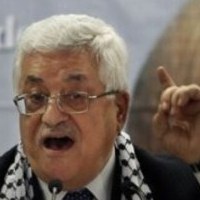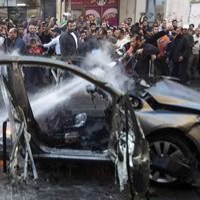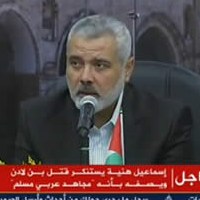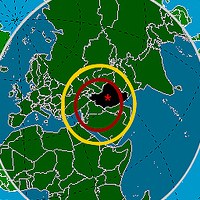![]()
Sun, May 08, 2011 | The Meir Amit Intelligence and Terrorism Information Center

Palestinian demonstrators in Ramallah calling for political unity between Gaza's Hamas rulers and the Fatah dominated Palestinian Authority which rules from Ramallah in the West Bank.
“Intifada of unity”: Iranian Press and its Support for the Palestinian Reconciliation Agreement
The Hamas-Fatah reconciliation agreement achieved in Cairo last week was enthusiastically supported by Iran. Last weekend, Iran’s foreign minister Ali-Akbar Salehi hailed the agreement as one of the achievements of the revolution in Egypt. Salehi said the agreement was an important step towards fulfilling the Palestinian people’s goals, adding that unity among Palestinian groups and resistance to Israeli occupation are the two most important factors for reclaiming the rights of the Palestinians. The foreign minister expressed hope that the agreement would help the Palestinian people achieve great victories in their fight against the occupation, and that the agreement would result in the opening of the Rafah crossing (Mehr, April 29).
Iran’s media also expressed unanimous support for the Palestinian reconciliation agreement, saying it is yet another expression of the positive developments that have taken place in the Middle East in recent months.
The conservative daily Resalat argued that Hamas and Fatah must take advantage of the regional developments in the Middle East and the erosion of the West’s status there to focus on fulfilling the Palestinian objectives, liberating Jerusalem, and returning the Palestinian refugees. Both Palestinian groups should treat the Palestinian objectives as a common ground for concerted action. The daily also claimed that Israel’s angry reaction to the agreement proves the need for Palestinian unity against the U.S. and Israel. Abu Mazen has to learn from the regional developments, change his policy, which so far benefited Israel and the U.S., and stop believing the false promises made by the West and Israel (Resalat, April 30).
The daily Keyhan said that the reconciliation agreement proves that the Palestinians fully realize the sensitive conditions prevailing in the region, and that Israel’s strong reaction to the agreement is proof of its significance. While Palestinian national unity may take a while to achieve, the reconciliation agreement is significant in that it signals an end to internal Palestinian conflicts, making it possible for the Palestinians to benefit from regional developments.
An editorial published by the daily asserts that, since the Cairo agreement recognizes the right of “resistance” to carry weapons, it will likely allow jihadist groups to resume their activity in the West Bank and Jerusalem. Hamas and the Palestinian Islamic Jihad’s return to the Gaza Strip, which may prove a complicated process requiring adaptation to conditions set by the Palestinian Authority, will allow Hamas and PIJ forces to openly resume their activities in the West Bank over the next several weeks. This will put an end to the four-year period of calm enjoyed by the “Zionists”, considerably changing Israel’s security situation in the West Bank and East Jerusalem.
The article further states that recent Israeli public opinion polls indicate that over 70 percent of Israelis support the establishment of an independent Palestinian state. According to Keyhan, the polls show the “Zionists’” weakness.
Referring to Abu Mazen and his leadership, the daily Keyhan said that the Palestinians do not trust Abu Mazen and his initiatives; however, they do believe that he is able to lead the reconciliation process. This is similar to the situation of Egypt: while Egyptians have no confidence in Mohamed Hussein Tantawi, chairman of the Supreme Council of the Armed Forces, they feel he can take Egypt through the process of transformation from a country ruled by a non-popular, secular government to one ruled by an independent, popular, and religious administration (Keyhan, April 30).
The daily Siyasat-e Rouz also estimated that the reconciliation agreement will help the Palestinians fulfill their objectives. An editorial titled “The Intifada of Unity” says that the agreement must be viewed as an expression of a new intifada launched by the Palestinians, and an important step that lays the foundations for fulfilling their objectives. The Zionists have always tried to exploit Palestinian differences of opinion to realize their own objectives, and the unity between Fatah and Hamas can be a step towards a united struggle against the “Zionist occupiers”. While the Palestinians wanted to resume the intifada ever since the second intifada, they have been unable to do so due to internal disagreements.
The reconciliation agreement reflects not only unity between the two Palestinian groups, but also unity between Gaza, the West Bank, and Jerusalem, which may constitute the beginning of a new intifada supported by the entire Palestinian people. Despite the expected attempts by the Palestinians’ enemies to foil the unity, the reconciliation agreement may bring the Palestinian people closer to ending the occupation and achieving their rights (Siyasat-e Rouz, April 30).



 RSS
RSS










“Intifada of unity”: Iranian Press and its Support for the Palestinian Reconciliation Deal | #Iran #Fatah #Hamas #Israel http://j.mp/mqUkpu